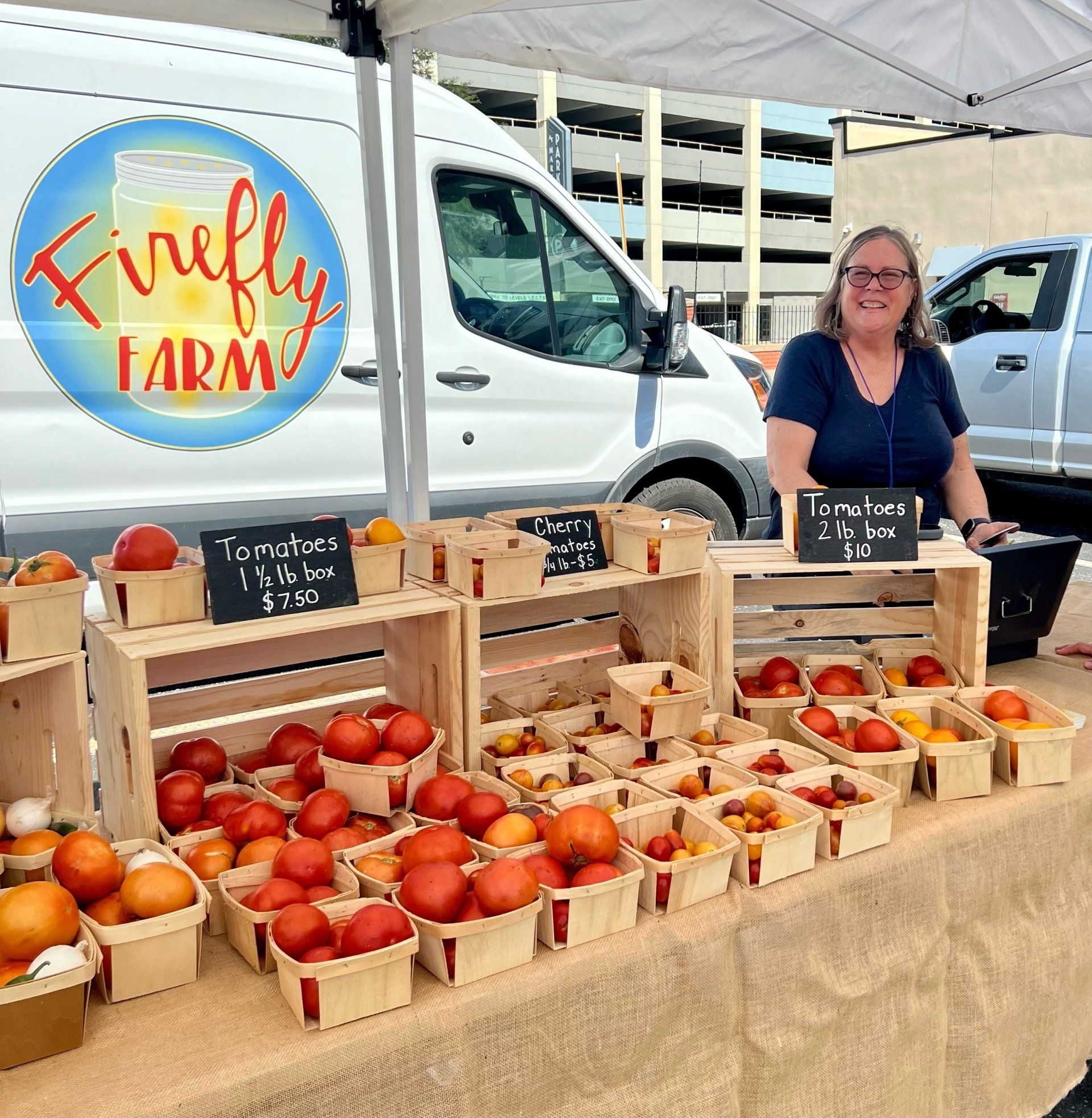GROWING UP

Leah Dannar-Garcia sells tomatoes and other produce at the Fidelity Farmers Market outside RISE Farms at 216 S. Market St. The final market of the summer is 11 a.m. to 1 p.m. Aug. 16
A Wichita woman has taken her green thumb to new heights with a 15,000-square-foot urban farm atop the Fidelity Bank RISE Car Park in downtown Wichita.
Leah Dannar-Garcia (pronounced Gar-sha) launched RISE Farms a little more than a year ago, and it’s now full force into its first growing season. Growing produce for 30 Wichita restaurants, the high-rise farm is an upstart extension of Dannar-Garcia’s Firefly Farm operation in east Wichita. The urban farm represents
what she hopes is a movement to enable sustainable jobs and ample food supply in an area that has relied heavily on exports and import sales.
The nontraditional farming practices introduced by Dannar-Garcia include a solar farm utilizing 204 solar panels that provide power to the RISE Car Park, located between Waterman and English. The building’s ground floor is home to the new GROW Giesen Plant Shop and First Mile Cantine.
Farm offerings grown on top of the building and sold to area restaurants include specialty crop vegetables representing all four seasons, grown year-round. Currently in season are peppers, squash, carrots, kale, cucumbers, beans, eggplant and tomatoes, and herbs like basil and lavender. Unlike commodity crop operations that focus on single crops such as almonds, wheat or corn, RISE diversifies its micro crop selections to promote product sustainability, fostering a growth alternative Dannar-Garcia says is more environmentally friendly to the planet.
“We look at building healthy, sustainable systems that are good for profit, the planet and people,” she said. “We're not certified organic yet, but we use organic principles in everything we do and plan to gain certification in the next year.”
Dannar-Garcia said she became enamored with nontraditional gardening through growing large quantities of heirloom tomatoes in her home garden. Growing more than she and her husband, Ron Garcia, could consume, she began doling out the excess produce to family members and friends, even including area
restaurants in the handouts. Eventually their nontraditional gardening hobby grew into a budding full-time project worthy of deeper exploration.
Discussions with Fidelity Bank and other area growers have since set the wheels in motion for what Dannar-Garcia imagines will ultimately give area residents plenty to feast upon in coming years. The eventual impact the venture could have on the community is almost beyond imagination, she said. Given
sufficient buy-in by surrounding communities, she envisions the project becoming something far more than simply another mom-and-pop storefront business.
“If everyone in the greater metropolitan area spent 25 percent of their food budget on locally produced food, we would create 28,000 new jobs, with $1 billion in wages and $3 billion in greater economic output,” Dannar-Garcia said. “It's a compelling argument for local agriculture.”
Certainly, the literal weight of the project is but one of the growing challenges of getting the fledgling business off the ground. With typical growing soil weighing more per square foot than an automobile, Dannar-Garcia said the use of a soil blend containing Rooflite, a volcanic-like rock utilized in place of traditional planting soil, enables growers to occupy the space necessary to grow without risk of bringing down the building from extreme weight conditions in the process. “It wouldn’t hold if we used soil,” Dannar-Garcia said. “Our growing medium blend is 70 percent Rooflite, 10 percent sand, and 20 percent compost. We fertilize weekly because this product has almost none of the microscopic organisms soil does. In our weekly fertilizing we also water in our mycorrhiza, which turns the Rooflite blend into a living thing that allows our plants to grow so well.”
Such soil saturation is one of the many lessons Dannar-Garcia said she plans to eventually offer in the community through a docent program in which Fidelity Bank employees will give educational tours. Additional plans call for utilizing bank employees in internship roles and other hands-on capacities.
“We're really looking forward to Year Two and expanding,” Dannar-Garcia said. “We've been calling this our baby year. Year Two we can help Fidelity develop its employee engagement programs.” Additional opportunities in the works will bring nontraditional farming lessons into classrooms at Coleman Middle School, East High School and other area schools.
As a former teacher, Dannar-Garcia said she finds this educational component to the equation particularly gratifying. “To date, this has been the pinnacle of my farming career,” she said. “Certainly, one of the best ways to secure our food system is to develop a robust local food system, with growers and farmers and hubs and so on. We’re really happy to be part of that.”
For more information on RISE Farms visit
fireflyfarmwichita.com/rise.html.
